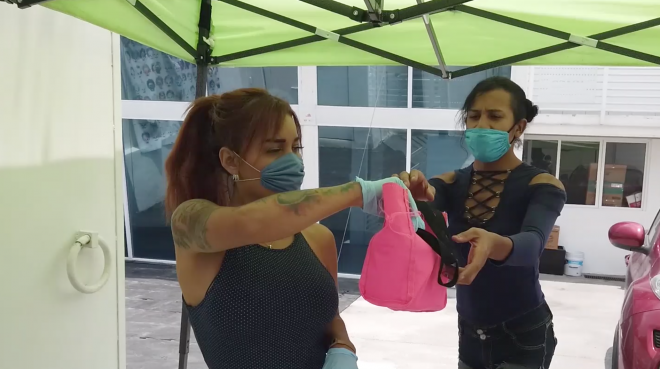
Trans women want a more inclusive world and lead by example, despite discrimination and exclusion. Countering the effects of the pandemic, they offer free food for residents in their neighborhood and for other trans women living on the streets. May 17 is the International Day against Homophobia, Biphobia and Transphobia.
The pandemic has generated new forms of solidarity and community building. A clear example of this is the work carried out by the civil organization Casa de las Muñecas Tiresias A.C., which provides shelter for 12 trans women at the “Casa Hogar Paola Buenrostro” in Mexico City.
The organization is also donating nearly 80 meals a day to people living in the La Casilda neighborhood of the Gustavo A. Madero municipality in the Mexican capital, or in other parts of the city where trans women are living on the street or practicing sex work.
Help is available to everyone
With an energetic but kind voice, Catherine Márquez asks people who come to the shelter in search of food to maintain distance to avoid risks of contagion. At the shelter’s door, she offers hand sanitizer and shows them how to rub their hands. «You should do it every time you wash your hands at home, it is very important,» she reminds them.
She then takes their temperature and finally asks how many people they need to feed. Other girls in the kitchen serve the portions and deliver them.
The people are thankful. Neighbors who live with scarce resources explain that they have been seriously affected by the COVID-19 pandemic, since their relatives or themselves do not have a stable job or a fixed salary. So receiving this help means a lot.
Catherine Márquez, deputy director of the Casa Hogar Paola Buenrostro, explains that they offer food Monday through Friday to all residents in the area. «We are at the top of the hill and it is difficult to go up and down to get food or basic necessities.»
They also provide food for trans women who are living on the streets or who are sex workers, and who have been seriously hit by the pandemic.
“We go to the Puente de Alvarado street and distribute meals to these women. Unfortunately, we can no longer receive them in the shelter. We would need a single room to isolate them and prevent the spread of COVID-19, but we do not have enough space and we do not want to put the rest of our colleagues at risk,» she explains.
A long-term struggle
The twelve women who live in this shelter are mostly sex workers. Some are living with HIV, most are not Mexican; there are Hondurans, Venezuelans or even Argentines. Some are undergoing treatment for substance use. They have not left the shelter since the second week of March because «there are no more clients and the hotels have closed, including the hotels where they used to live. We brought them here because they had nowhere else to live,» explains Catherine Márquez.
That is the purpose of this shelter, which was given to Casa de las Muñecas Tiresias last December. However, the work to get this house as well as the recognition of their rights, has been going on for years.
The organization’s director, Kenya Cuevas, started this fight in 2016 when Paola Buenrostro, her friend, also a sex worker, was killed by a client on the streets of Mexico City.
Since then, Kenya Cuevas and those who make up the organization have struggled to find justice, to have this shelter, to ensure access to treatments for those living with HIV, to have the right to have an identity, to secure refugee status, and even to be able to finish their education.
Using the lockdown to learn and secure a better future
The shelter stands thanks to donations. Furniture, glasses, blankets, soaps, towels, mattresses, clothes, makeup, wigs and shoes have made this house a true home for the women who live there today.
There they share their experiences, their stories, their knowledge — and they dream of a different future. Thanks to the organization’s efforts, many are keen to finish their studies. Others are already putting their skills into practice by creating videos, or managing the organization’s social media and teaching others.
There are those who contribute their time to teach the women skills that can help them improve their quality of life.
This is the model for social reintegration and economic autonomy that is being implemented, explains the organization’s deputy director. As part of this model, women receive the opportunity to learn general culture. They also have access to health services and guidance to set their identity documents in order, among other benefits.
«We want to open that to the whole community once the pandemic passes. We want to be inclusive,» says Catherine, who, like the girls who live in the shelter today, dreams of a world in which all people can enjoy full rights, regardless of their sexual orientation, identity or gender expression.
«What we are going through today is a great challenge and experience for humanity. It allows us to do internal work, to be less selfish. We have to realize that we are sharing a space, a planet. What we should take away from this experience is to be more inclusive, to see ourselves not as men or women, how you dress, or as trans, bi, hetero or polyamorous, but only as human beings”.
The United Nations has called for equal rights and fair treatment of lesbian, gay, bi, trans and intersex people worldwide.
In July 2013, the Office of the United Nations High Commissioner for Human Rights launched the “Free and Equal” campaign, a global and unprecedented United Nations public information initiative to promote equal rights and equal treatment of LGBTI+ persons. Currently, an effort is being made to ensure that no LGBTI+ person is discriminated against during the COVID-19 health emergency.
Production Gabriela Ramírez and Luis Arroyo
United Nations Information Center – Mexico.
